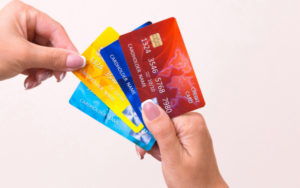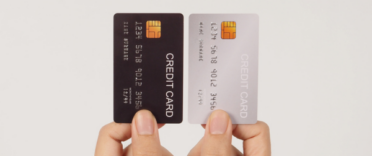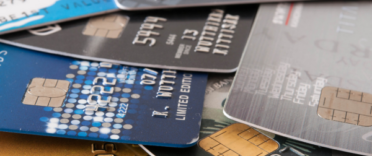 The number of credit cards you can have will ultimately depend on how many credit card providers are willing to give you one. An applicant with a good credit score and sizeable income may be able to take out as many credit cards as they like, while someone with less financial security may struggle to get one good credit card. The ideal number for you should be based on what you want to use the cards for and how much existing debt you have. In this article, we will take you through all of the options to help you find the right answer.
The number of credit cards you can have will ultimately depend on how many credit card providers are willing to give you one. An applicant with a good credit score and sizeable income may be able to take out as many credit cards as they like, while someone with less financial security may struggle to get one good credit card. The ideal number for you should be based on what you want to use the cards for and how much existing debt you have. In this article, we will take you through all of the options to help you find the right answer.
How many credit cards should you have?
There is no fixed amount of credit cards that anyone should have; the right number depends on your own financial situation. An important part of having a credit card is being able to manage the debt that you build up, so you don't want to have so many credit cards that keeping track of the balances becomes unmanageable.
At the same time, it might be a good idea to have different credit cards to solve different problems. If you need to transfer an expensive credit card balance, it makes sense to get a 0% balance transfer credit card. If you want to earn rewards on your spending, it makes sense to get a rewards credit card. It is true that some credit cards can cover many bases, but the best credit cards will be specialist ones.
Think about the benefits of taking out that extra credit card and whether they outweigh the negatives of dealing with another monthly payment and managing additional debt.
Which credit card should you have?
The right credit card for you will depend on what you want to use it for. Here is a simple summary of how the main types of credit cards can help you.
| Reason to get one: | Type of credit card: |
| Build a credit history | Credit-builder card |
| Reduce the cost of debt | 0% balance transfer credit card |
| Reduce the cost of existing debt while continuing to spend | Balance transfer and purchase credit card |
| Earn cashback and rewards on your spending | Cashback and reward credit card |
| Spread the cost of expensive purchases | 0% purchase credit card |
| Spend abroad | Travel credit card |
| For an emergency | Money transfer credit card |
You could also look at our article ‘Best credit cards in the UK’ to find the best deals on all credit cards.
The pros and cons of having multiple credit cards
Here are the key advantages and disadvantages of having more than one credit card:
The pros of having multiple credit cards
- Different credit cards can help your finances in different ways - You can use different credit cards in different ways. The best credit card for getting rewards on your purchases is unlikely to be the same as the best credit card for balance transfers. Having both types of credit card can help you make sure you have the best tool for each task. We explain how to work out what type of credit card you need in our article ‘Which credit card is best for me?’.
- A dedicated purchase credit card can help you build your credit score - If you don't already have one, getting a credit card to use for regular day-to-day spending, then clearing your debt at the end of the month will help fill up your credit file with responsible borrowing. Applicants with a limited credit history may struggle to get the very best credit cards or the best rates and deals available. We have more detail on how a credit card can help your credit score in our article ‘How to build your credit score with a credit card’.
- Save money with a 0% balance transfer credit card - If you have an existing balance on a high-interest card, a second credit card can be very useful – especially if it is a 0% balance transfer card. These credit cards allow you to move over an existing balance for a fee, but do not charge interest for a set number of months. This gives you time to clear the balance before it grows with interest. We explain more in our article 'What is a balance transfer credit card and how does it work?'.
- Available credit can be useful in an emergency - If you have multiple credit cards, each card will come with its own credit limit. This can boost the amount of money you have available to spend compared to if you only had one card. Some of this credit could work as a useful backup should you be hit by any unexpected costs.
- A long-term card is good for your credit history - Most long-term financial relationships look good on your credit file, so long as you are regularly paying back anything you owe. This means that you should not necessarily get rid of an old credit card just because you want a new one.
- Get a card for a specific purpose without losing the benefits of your old one - You may be very happy with your credit card, but want to take advantage of a special rewards offer or a particular feature, such as a money transfer or free spending abroad. You can keep your old card and get a new one for that particular task.
The cons of having multiple credit cards
- Having multiple credit cards can tempt you to overspend - The more credit you have available, the more tempting it will be to spend a bit extra and worry about it later. You will usually have a higher total credit limit across multiple cards compared to just having one. This could make it difficult to repay the balance you build up. It is important to always pay at least the minimum payment on a credit card, though you should budget to clear the balance before any interest-free period ends. Read our article 'What is the minimum payment on a credit card?' to learn more.
- It can be challenging to manage multiple repayments - More than one credit card means more than one bill and more than one repayment each month. For some people this can be tricky to manage and may increase the chances of missing a payment, facing hefty extra charges and losing any 0% offers on the card. If you are able to set up a direct debit to pay the full balance, you will not need to worry about manually making multiple payments each month.
- Your available credit can affect future applications - When you apply for a loan or credit card, the lender will usually look at how much available credit you have. Having multiple credit cards will usually mean that you have a lot of credit available to you. A prospective lender will consider the possibility of you maxing out all of your cards at once. This could make it think that offering you more borrowing power could be a risk.
- Not using a credit card can affect your credit score - Only using a small percentage of your available credit can negatively impact your credit score, as it may suggest you are not managing your finances efficiently. It may also raise suspicions if you apply for more credit when you have existing credit going unused. This can happen quite easily if you have more than one credit card, but only use one for regular spending.
- An emergency credit card can be inflexible - Holding onto an extra credit card to act as an emergency option can be useful, but you may be stung by the limitations of spending with a credit card. Some expenses cannot be covered with a credit card, so having an emergency cash fund may be a more flexible option to deal with unexpected costs.
How to find out which credit card is best for you
We have teamed up with Creditec* to help you compare credit card deals and check your eligibility in minutes. You will be able to find out which credit cards you are most likely to be accepted for through a soft credit check, which will not affect your credit score. You can then tailor your personalised list to sort cards by the features that matter most to you. This could mean filtering for the type of credit card you want, sorting the list by the rate of interest or highlighting the cards you are most likely to be successful in applying for. You can click here to compare deals*.
How many credit cards can you have?
How many credit cards you can get will be limited by your credit history. A big part of applying for a credit card is a credit and affordability check carried out by the provider to determine if you will be able to afford repayments. If you already have a high level of available credit, a provider may judge that you would struggle to repay any balance you build up on your new card.
The best way to get a credit card is to only apply for one if you think you need it and you think you will be successful. You can check your eligibility for a card before you apply by going to our article 'Check credit card eligibility: What credit cards am I eligible for?'.
If a link has an * beside it this means that it is an affiliated link. If you go via the link Money to the Masses may receive a small fee which helps keep Money to the Masses free to use. But as you can clearly see this has in no way influenced this independent and balanced review of the product.






